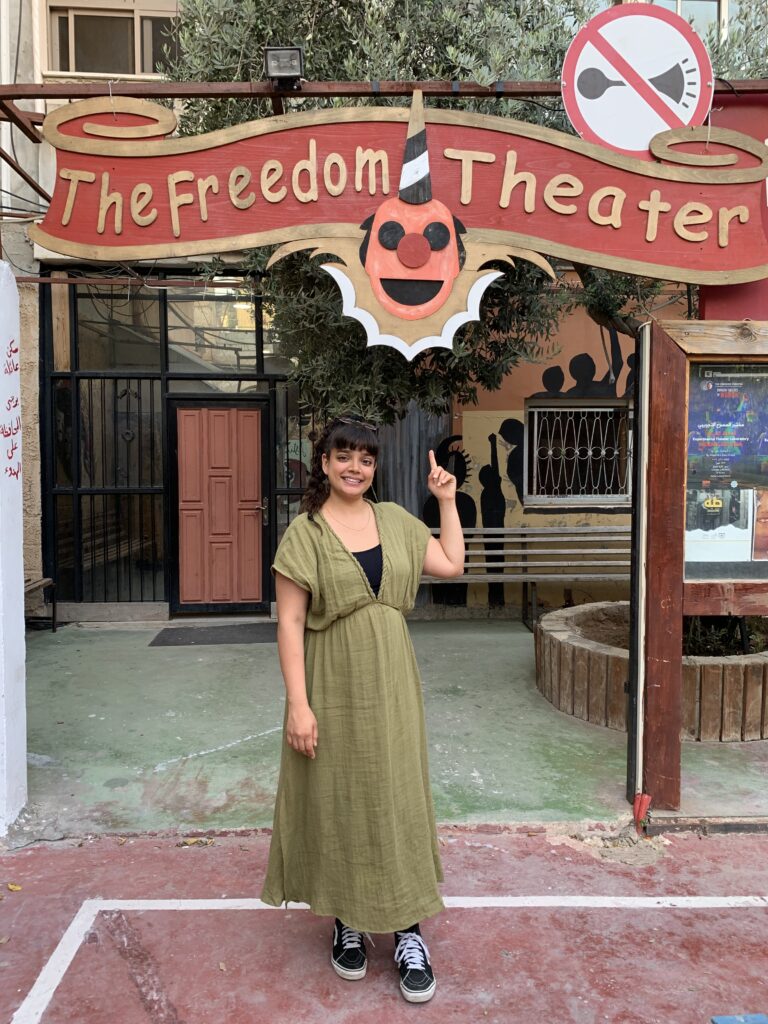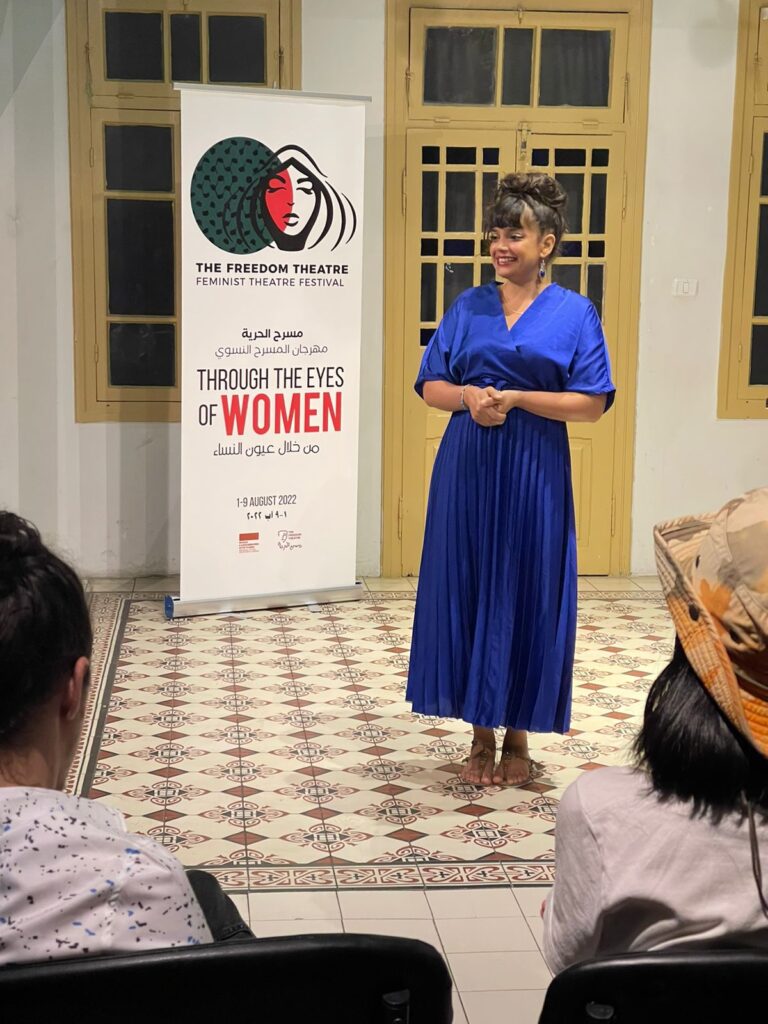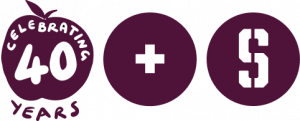By Shareefa Energy.


I was invited to The Freedom Theatre in Jenin Refugee Camp in the West Bank in Palestine as lead facilitator for the 2022 ‘Through The Eyes of Women – Feminist Theatre Festival,’ to deliver poetry and creative writing workshops, alongside performing poetry in Jenin and Ramallah. I last facilitated poetry and public speaking workshops with students in the West Bank in Nablus at An-Najah University in 2011. Workshop and performance schedules were postponed and cancelled last minute throughout the festival on numerous occasions, due to locals being murdered when the Israeli army invaded the camp. Witnessing the pressure on local Palestinian actors and students and The Freedom Theatre staff having to repeatedly reschedule and join local strikes, was an unfair reality. Palestinian creatives schedule is dictated by the Israeli occupation, the overbearing anxiety of a bereavement occurring close to home at any given moment.
I do workshops in England in schools, universities etc and I am also an activist and facilitator, working with those directly impacted by state violence from Britain to Palestine. Most of my work in institutions is about educating and presenting narratives. When working with communities who have deep trauma from experiencing state violence, the focus is on writing being a cathartic release, addressing a wound, releasing it, allowing a place for the rage and grief to sit externally. To look after my mental and physical health, poetry had to emerge for me to be able to process the burden of state violence inflicted on our communities. I always understood the importance of supporting others to release and not just experience the pain of existing in this unjust world.
Facilitating in Palestine required patience and understanding of the occupation and not having usual expectations, knowing last minute my performance could be postponed mid rehearsal cause the neighbours family was now bereaved. The Freedom Theatre continues to be a safe space for young people and children, attempts to continue as ‘normal’. The blessing of being a facilitator whose supported the Palestinian cause for decades, meant holding space with young people and women about their life experiences and providing a creative outlet through poetry. I was able to present them realities in Britain, talk to them about Tamir Rice, about Grenfell, about gentrification in Tottenham and critique white liberal feminism. My workshops were more than just a space to write, they were a safe space to converse, to be asked questions on topics that were taboo, open discussions about women’s rights locally, listen to their wishes for young girls in Jenin, having young men come forward wanting to discuss the impact of domestic violence on their lives.
On my second night of arriving in Jenin Refugee Camp, a 17-year-old Palestinian boy Dirar Kafrini was murdered horrifically by sniper by the Israeli army in Jenin Refugee Camp. The theatre paused the festival in solidarity with Dirar’s family. I witnessed numerous local and national strikes during my 2 months in Palestine. Respecting the local communities’ decisions and being ready to accelerate or brake accordingly was needed, without taking it personal. Gaza was bombed on Friday 5th August, my performance at Fragments Theatre in Jenin had rightfully been postponed in solidarity with Gaza. I was grateful The Freedom Theatre made the decision to reschedule the event. We weren’t in the mood to reduce casualties to poetry soundbites, as though words were enough to commemorate innocent martyrs when blood on the streets hadn’t dried.

Facilitating respite and a safe space for young people to process was an honour, to pass on writing skills and see people surprised when uniting with the poet in them, encouraging them to express their own stories and be autonomous in this struggle, challenging this idea of ‘voiceless’ communities. A 16-year-old only just started to process immense loss from when he was a child, my role was to prioritise listening over writing, converse and only then support him to write about it, to get it off his chest and remember his voice and grief is valid.
I’ve written a lot of poetry about Palestine that I perform regularly in the community, at protests etc to unite people to show solidarity with Palestinians. I mention Palestine when I’m performing at an anti-racism conference, use my role as a poet and educator to speak up about apartheid at a plush venue in Shoreditch and in the classroom.
“You want me to write about the martyr
And my mind asks, which one?
You want to write. About Salah but not about Yousif
About Ibrahim. But not about Ebtisam.
About Shireen. But not about Baraa’.
About Sind and not about Yazid.
I don’t write about my friend
martyred at the gates of Jenin Refugee Camp,
beaten to death by the hands of Israelis
the burning tyres didn’t protect him.” Jamal Abujoass (22, The Freedom Theatre student)
Facilitating workshops under the Israeli occupation in Palestine where extrajudicial killings is a regular occurrence, is about being mindful and politically aware of the dynamics and sensitive towards the layers of grief and injustice the community continue to be exposed to. Unlike working with North Kensington community after the Grenfell fire with PTSD, Palestinians do not have ordinary PTSD. The trauma is ongoing with no respite, awaiting another raid, another loss of life of someone close, hearing another staff member was harassed at a checkpoint and kidnapped under administrative detention like The Freedom Theatre chair Bilal Al-Saadi and the co-founder of the theatre Zakaria Zubeidi in Israeli prison. On the morning of 21st November 2022, Mahmoud Al-Sadi, a 17-year-old trainer for The Freedom Theatre Child and Youth Program from Jenin refugee camp was murdered by the Israeli army during a raid on his way to school. The theatre devastated went into collective mourning, he was a part of the theatre since he was a child, accessing art and laughter away from the brutal reality of the occupation outside. Even he couldn’t escape the occupations bullets.
Jamal told me he wished he could have lived a life where he could hear the sound of music solely in the air like the rest of the world, not the daily violent music of gunshots in Jenin Refugee Camp. I wondered what beautiful freedom he would write about as a talented writer if life under occupation wasn’t forever present in his psyche, forced to be on high alert. He is forced to confront the Israeli occupation daily through his poetry. I have the privilege of being further removed from this reality, only writing about Palestine when something emotionally upsets me and the choice to recite about Palestine. It’s an option to disrupt and discuss using poetry, there is no option for Jamal.
‘You can’t write poems about trees when the woods are full of policemen.’ Berthold Brecht
Days after I left Palestine at the end of September, the Israeli army begun raiding Jenin Refugee Camp during the day as well as in the dead of the night. On 3rd November, Ahmed Tobasi the artistic director of The Freedom Theatre and actor recorded a powerful video in despair, when could they continue as a Theatre like the rest of the world without interruptions and fearmongering by the occupation.
Only when the Israeli occupation crumbles will artists in Palestine be able to exist and create without the perimeters of the overbearing ghoul of the occupation. They are forced to navigate this reality, to use art to advocate their rights to the international community. International poets, artists and practitioners need to push more in solidarity with Palestinians to ensure we all have an equal right to freedom and the space to write, create and perform without worrying about the next military raid, the next blackout during a workshop cause the Israeli army showed up and cut off the electricity. Palestinians are not mere soundbites to cram into one line of a poem. They are loved, they are part of communities, they are martyred youth who will be missed. Everyone deserves the right to create without such heaviness, grief and violent interruptions surrounding their everyday.
I scroll on twitter to see Jenin Refugee Camp has been raided by the Israeli occupation and a massacre has taken place weekly, I rush to check on my friends and the young people I worked with in Palestine concerned of their safety and their grieving process. A 17-year-old lost another friend days apart, who was also a child. I remind him to write in the book I gifted him for him to continue to express himself during my absence and utilise the coping tools I shared with him. He’s young and bright, yet there’s sorrow in his eyes and ongoing hauntings. I’m stuck on crediting how practical poetry is when Palestinians live under such turbulence, though it provides glimmers of hope and the safe space for conversations that would have stayed buried under the mantlepiece rug, it allows the international community to feel. I instruct the young people to write about coffee as a warmup exercise. “I dislike the taste of coffee like how I detest the Israeli army who harasses my community,” a teenager writes. Every line is riddled with the presence of the occupation. How much longer will this ongoing trauma be allowed to continue?
Please support https://www.artistsonthefrontline.com www.freedomtheatre.com

about Shareefa Energy
Shareefa Energy is a poet, performer, writer, author, activist, educator, creative campaigner, workshop facilitator and arts and wellbeing practitioner of Indian and Muslim heritage from Leicester and London. She is the author of poetry collection Galaxy Walk. Her poetry is raw, honest and consistent against injustice. She was awarded with the UK Entertainment Best Poet 2017 Award, a nominee for the Muslim Women Arts & Entertainment Awards 2021 and for the Eastern Eye Arts, Culture & Theatre 2019 award by the Arts Council.
Her poetry has featured on BBC The One Show, Channel 4 and ITV. She has facilitated creative writing, poetry, storytelling and performance workshops internationally, from Palestine to Sierra Leone with schools, universities, academics, in immigration detention centres, with survivors of domestic violence and with those impacted by state violence.
Twitter: @ShareefaEnergy
Insta: @shareefaenergy
Shareefa’s Website: https://www.shareefaenergy.com
